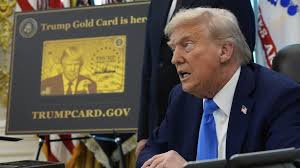
President Donald Trump has signed an executive order unveiling a controversial new immigration policy dubbed the “Trump Gold Card,” which allows wealthy foreign nationals to secure fast‑track U.S. residency by making a $1 million unrestricted gift to the U.S. Treasury (or Commerce Department), with corporations able to sponsor individuals at $2 million.Under this plan, applicants must also undergo vetting through the State Department and Department of Homeland Security and pay a nonrefundable processing fee. If approved, they would be granted lawful permanent resident status, replacing parts of the current employment‑based visa categories (EB‑1 and EB‑2) which are expected to be suspended or phased out. The administration projects the program could generate over $100 billion in revenue, which Trump says will go toward tax cuts, infrastructure, and reducing the national debt. Still, the plan has drawn criticism from immigration advocates, legal experts, and industry leaders who argue that it effectively buys access to residency, may worsen inequality, and raises constitutional questions over bypassing Congress in altering visa and immigration laws.






